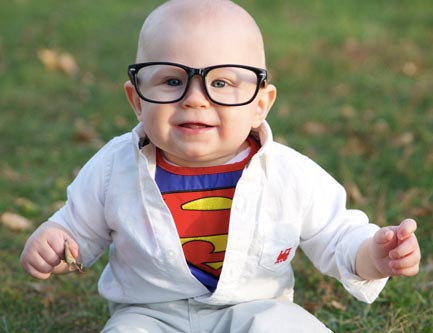
To sign or not to sign? That is the question many new parents ask themselves as they navigate the first year of their child's life. And it's one of the most common questions I'm asked as a Speech-Language Pathologist.
My 10 second response:
"Introducing signs doesn't harm babies - but there is also no evidence to show that signing is beneficial either. Don't waste your time and money on baby sign books, videos, classes, or flashcards."
Here's why...
Baby sign does not enhance language development
Advocates of baby sign language often list references that support the claim that children are better off for having been introduced to signs (example). But, for a variety of reasons, these studies are flawed, rendering the results inconclusive. There is no evidence to prove that signing enhances language development in any lasting or significant way.
Babies who sign don't necessarily communicate better
Many people don't realise that babies are communicating long before they can speak. They let you know when they are upset, happy, anxious, relaxed, etc. in a variety of non-verbal ways. Examples include facial expressions, squeals, crying, and, in the weeks and months leading up to their first birthday, gestures. The use of gestures to communicate always precedes spoken language. Babies have the motor skills to form basic gestures, but they don't yet have the oral motor control to say words we can understand.
It is not uncommon for people to mistake signing as a superior form of communication to naturally-occurring gestures and other non-verbal communication. However, this is not the case - baby signs are really just a symbolic representation of other things - much like gestures. A child pointing to a desired object, waving 'hi' and 'bye', reaching toward something, or lifting their hands to be picked up are generally understood by most strangers. In order for signs to be understood, the person needs to understand the signing vocabulary. So in some ways, "regular old gestures" are better, because they're understood by a wider audience.
Watch the beginning of this video. Baby Holden gestures to have "more food" by smacking his lips. Unfortunately, his parents were so caught up teaching him to sign, they missed that he was already gesturing "more" naturally! This nonverbal communication is equally effective to signs, and has the added benefit of universal comprehension by people who don't know the signing vocabulary.
Baby sign language does not prevent nor cause speech-language delays
Most speech delays are due to genetic and medical issues, all of which cannot be overcome by introducing signs. Similarly, there is no conclusive evidence to show that baby sign language causes speech-language delays or disorders. We know this because hearing babies exposed to sign language are not more at risk for speech-language issues than other children. We have all heard anecdotal accounts of children who signed in the place of talking until the age of 3 or 4. These children would likely have been delayed without having been introduced to signs.
If your baby doesn't learn baby sign language despite your best efforts, don't worry that something is wrong.
Some children pick up signing early and easily, while others don't. Be patient with your baby. They all develop at a different pace. If learning signs is your only concern about your baby's development, there is no need to worry. However, if you have other concerns, talk to your doctor or see a Speech-Language Pathologist.
Not all children with speech-language disorders should be taught signs
Sign language is at the heart of deaf culture, and its importance and utility for the deaf community must not go unstated. Deaf children aside, signing is not appropriate for all nonverbal children, or children with particular diagnoses. Ask your Speech-Language Pathologist if you think signing might help your child.
Parents can opt to introduce basic signs to their infants as a fun way to interact with them -- it can be a great way to start tuning in to a baby's communication attempts. But parents who think they are going to turn their child into a "super baby" through expensive signing programs are barking up the wrong tree. If you do choose to sign with your child, be careful not to miss rewarding your child's naturally-occurring gestures and early communication attempts. Gestures, eye contact, facial expressions and words are awesome ways for kids to communicate, and are an important step along the way toward their first words.
